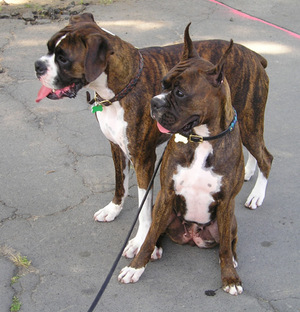Colitis is a general term given to any reason the colon is inflamed. The colon is another name for the large intestine. Colitis can be a brief episode, but often it becomes a chronic condition. However, colitis is often manageable through changes to a better diet, and medication. But the most important thing you can do to help a dog suffering from colitis is to discover why he has it in the first place. Unless you take care of the root problem, the colitis will keep on coming back.
Symptoms of dogs with colitis include constipation, mucus mixed in with the stools, more flatulence than usual, crying out in pain when trying to defecate and sometimes fatigue. Although sometimes the episode will clear itself up after a couple of weeks, dogs with any kind of colitis need to be seen by a vet as soon as possible. Ask your vet whether you need to bring a stool sample with you. That may help your vet determine the many causes of colitis that your dog is suffering from.
This is more common in dogs that are easily stressed out. This depends more on the individual nature of the dog rather than what breed the dog is. Any kind of stress can trigger a colitis attack. The only difference in the usual colitis symptoms is that the dog usually suffers from diarrhea rather than constipation.
Whipworms (Trichurius vulpis)
Several kinds of internal parasites may trigger colitis or another kind of digestive upset in a dog, but the most common are whipworms. Whipworms can be prevented by giving your dog worming medicine regularly. Infected dogs will often have bloody diarrhea as well as other colitis symptoms.
This rarely happens because in order for the dog to get this kind of colitis, he would have to have immunity problems. An otherwise healthy dog would not be bothered by this because their immune systems can easily handle it.
Prototheca Colitis
This is another rare type of colitis that can be potentially lethal. It’s caused by a type of algae. Unfortunately, according to “Dog Owner’s Home Veterinary Handbook” (Howell Book House; 2007), the chances of a dog surviving this infection are slim.
Foreign Bodies
Colitis may be brought on because the dog swallowed a non-food item like a stone or a plastic toy that is blocking the colon or intestine. The dog’s digestive system is going into overdrive to try and push the offending object out. Other symptoms of foreign body blockage (besides the usual colitis symptoms) include loss of appetite, vomiting and weight loss. This needs immediate vet care. The dog may need immediate surgery in order to remove the offending object.
Ulcers
Most dogs do not this type of colitis, properly called histiocytic ulceratice colitis, but it does show up a lot in boxers. Dogs begin chronic bouts of colits by the time they are two years old. The prevailing theory is that the ulcers are caused by a problem with the dog’s immune system. This can be treated with diet and an antibiotic called entofloxacin.
References:
“Dog Owner’s Home Veterinary Handbook.” Debra M. Eldredge, DVM, et al. Howell Book House; 2007
“The Veterinarian’s Guide to Your Dog’s Symptoms.” Michael S. Garvey, DVM, et al. Villard; 1999.
Mar Vista Animal Medical Center. “Colitis.” http://www.marvistavet.com/html/body_colitis.html
Vet Info. “7 Common Causes of Colitis in Dogs.” http://www.vetinfo.com/causes-colitis-dogs.html
Reference:
- www.vetinfo.com/managing-colitis-diet.html
- www.petplace.com/dogs/irritable-bowel-syndrome-ibs/page1.aspx
- www.boxer-rescue-la.com/colitisdiet.html
